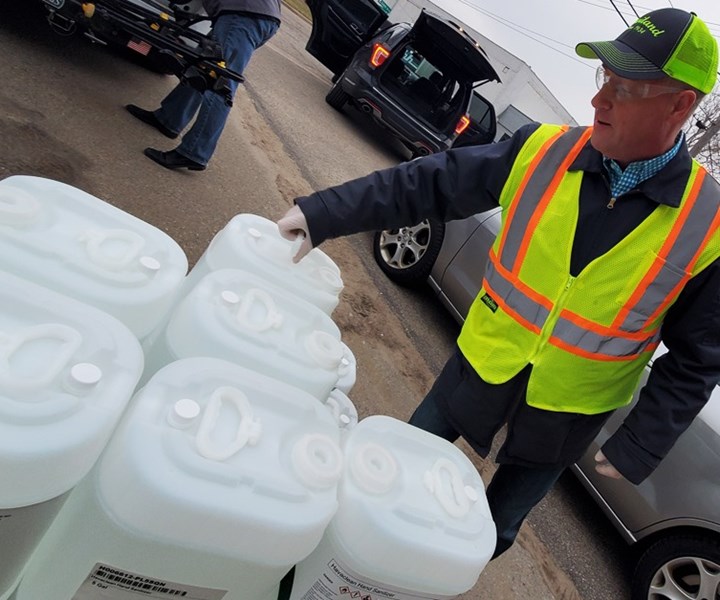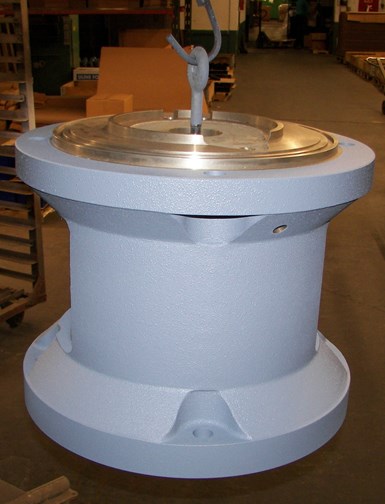
Haviland Enterprises is producing hand sanitizer and delivering in bulk 5 gallon pails at no charge for groups within its local community. Photo | Haviland Enterprises
I stepped into the role of editor-in-chief of Products Finishing in March, hoping to quickly get up to speed on the finishing industry and the process for creating this magazine. After all, I’ve been involved with our sister publication CompositesWorld at Gardner Business Media for a couple of years and this should be a quick transition, right? The plan was to figure out a few procedure-related things and then get down to some real work, perhaps even a few new ideas for the brand. How do you guys feel about podcasts?
Then, of course, the coronavirus pandemic escalated and everything changed. Gardner staff found themselves working from home, many of us juggling work with homeschooling kids and trying to strategically keep our households stocked with food and supplies. All of the “normal procedures” were augmented as we all sought workarounds to processes I hadn’t really had an opportunity learn. The finishing industry I was seeking to understand, along with every other industry, not to mention our very way of life, was turned on its head.
I’m not writing this as a big “pardon our mess” sign. I’m quite proud of the work our company is doing in the midst of the coronavirus crisis. Gardner’s editors quickly set out to find ways to report about how the COVID-19 situation was affecting business — to lend our contributions to our communities in the way we know best: by reporting and helping to connect manufacturers and those who need their products. Beyond having work to do, it feels like a meaningful way we can support our audience during this difficult time.
In the early days of the coronavirus crisis in the U.S. — which seems so long ago though it has only been about a month — many of the shops we spoke with said things hadn’t changed much. Products still needed to be made. Then California and Pennsylvania issued stay-in-place orders, closing all nonessential businesses. Other states soon followed suit. Many of the manufacturers we have been in contact with are considered essential businesses and are continuing to operate.
“We are maintaining production volumes for several medical device companies during this time and helping to ensure adequate availability for devices that are used in life-saving surgeries,” says James Morris, president and CEO of Surgical Coatings. “We have witnessed particular electrosurgical products increase in volumes in response to COVID.”

Giering Metal Finishing is conventional wet spraying centrifuge bases for a company that manufactures ultracentrifuges, which will be used to make vaccinations for COVID-19. Photo | Giering Metal Finishing
George Giering, president of Giering Metal Finishing in Hamden, Connecticut, says his company is coating ventilator housings, heat exchangers for chest X-ray systems, robotic surgical system components and centrifuges. “We just received word that we’re getting some [centrifuges] in that are going to be used for the vaccination efforts.”
Many companies have pivoted their focus to address shortages in much-needed equipment and supplies, including personal protective equipment (PPE) and general-purpose sanitizers. For example, Winona Powder Coating of Elkhard, Indiana says it has been coating parts for the large volume of temporary hospital beds being put in place.
Products Finishing, along with other Gardner brands covering manufacturing-related industries, has gathered a compilation of such stories and resources — our collective coverage can be found at pfonline.com/blog/category/covid-19. We’ll continue to share the stories of collaboration and ingenuity that we learn about as we all navigate the days and weeks to come. The response by the whole of manufacturing has been nothing short of inspiring and is discussed in an op-ed by Gardner Business Media President Rick Kline Jr. which was published in the Wall Street Journal.
What will happen from here, we can only guess. As the world rebounds and our communities see the impact of not having domestic access to the products that people rely upon on a daily basis, the opportunities for local manufacturers will likely increase. The supply chain will undoubtedly change and the current ways of doing business will be tested and reassessed. Everyone working in a manufacturing-related field must be prepared to adapt to those changes and operate as nimbly as possible.
As I look at the evolving situation around me and try to adapt to my new role, reinvent processes and basically just figure out what the heck is going on — it’s clear to me that everyone is in the same situation one way or another. We’re setting up makeshift offices in the corner of our sunroom, trying to teach our kids math during odd-hour “lunch breaks,” and basically just trying to make up the time and get the work done whenever we can.
We all strive for a return to normality, but I wonder just how we’ll actually emerge from all of this. The lessons we learn from having to rethink how we work, communicate and live may very well have a lasting influence on how business and society works. Just the other day I received an invitation to an online conference, complete with a virtual exhibitor space. It wasn’t surprising. Many conferences and trade shows are examining their options and considering this kind of format. As companies invest in more resources to keep employees working remotely, what will it mean for the adoption of Industry 4.0 solutions?
The implications of the coronavirus are huge in so many ways and not just the obvious ones. As we recover from this mess, how many companies will use lessons learned during this time to reevaluate the way they do business? How will the areas where we’ve been forced to operate leanly in the short term influence our future business behaviors as we weigh overhead costs, resources and environmental responsibility? What will “business as usual” look like at the other end of this? Only time will tell. Please take care of yourselves and each other.
How has the COVID-19 pandemic affected your shop or business? We want to help you tell your story and keep the coating and finishing industry informed in this constantly evolving situation. Reach out to me at sfrancis@pfonline.com.
Related Content
AkzoNobel Uses VR for Training Airline Apprentices
The virtual reality technology provides a paint booth and spray gun that enables trainees to work and master their skills without losing parts in the process.
Read MoreUmicore Metal Deposition Solutions Names Managing Director of Electroplating Business Line
Michael Herkommer has been named managing director of the electroplating business line at Umicore Metal Deposition Solutions.
Read MoreVCS Hybrid Cup System Helps Increase Productivity
The system combines the benefits of vented hard cups and sealed liners.
Read MoreThe Art of Multitasking
In the frenetic pace of today’s world, keeping up with projects and responsibilities can sometimes seem daunting — here are a few multitasking strategies that may help.
Read MoreRead Next
Episode 45: An Interview with Chandler Mancuso, MacDermid Envio Solutions
Chandler Mancuso, technical director with MacDermid Envio discusses updating your wastewater treatment system and implementing materials recycling solutions to increase efficiencies, control costs and reduce environmental impact.
Read MoreA ‘Clean’ Agenda Offers Unique Presentations in Chicago
The 2024 Parts Cleaning Conference, co-located with the International Manufacturing Technology Show, includes presentations by several speakers who are new to the conference and topics that have not been covered in past editions of this event.
Read MoreEducation Bringing Cleaning to Machining
Debuting new speakers and cleaning technology content during this half-day workshop co-located with IMTS 2024.
Read More







.jpg;maxWidth=300;quality=90)












